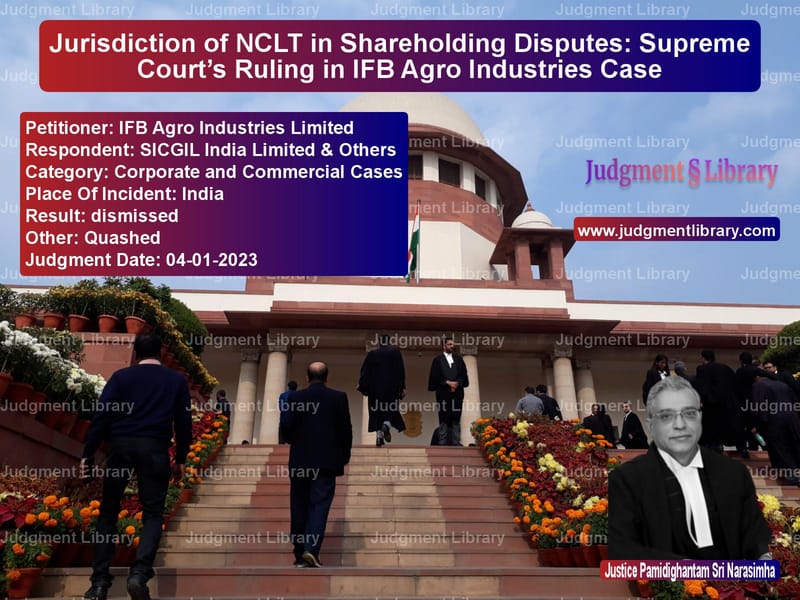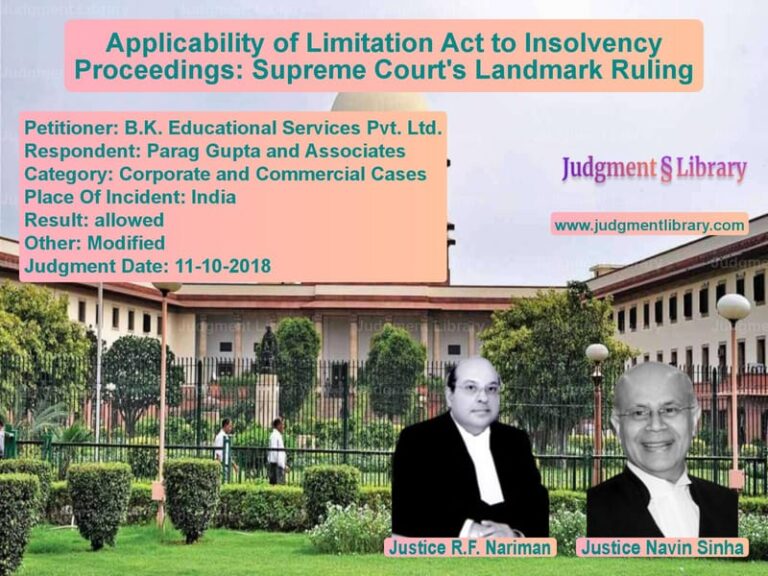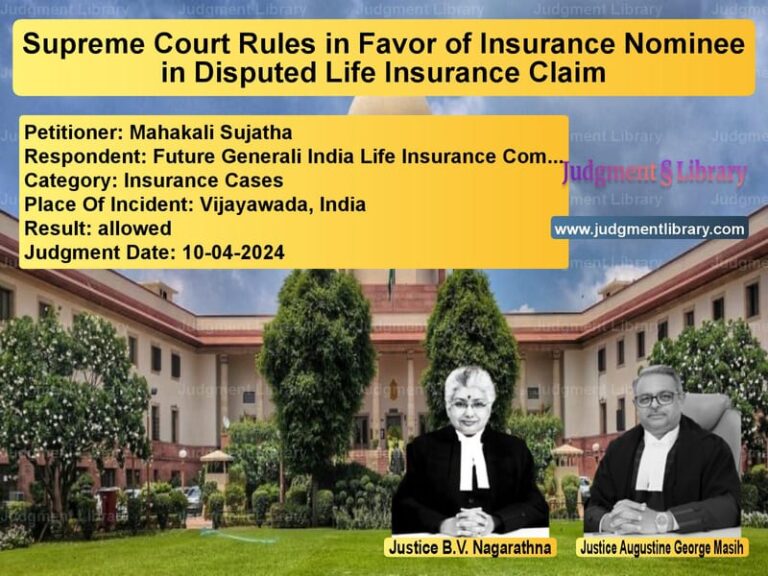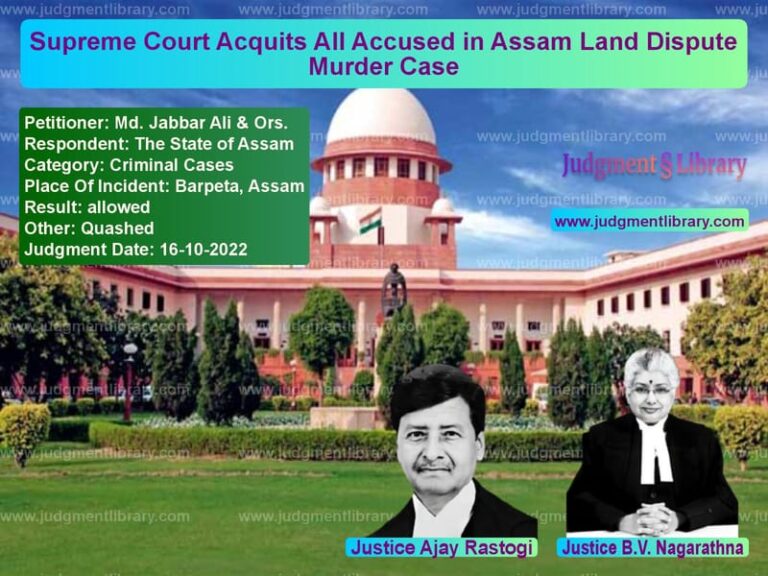Jurisdiction of NCLT in Shareholding Disputes: Supreme Court’s Ruling in IFB Agro Industries Case
The Supreme Court of India recently delivered a significant judgment in the case of IFB Agro Industries Limited vs. SICGIL India Limited & Others. The case revolved around the rectification jurisdiction of the National Company Law Tribunal (NCLT) under Section 59 of the Companies Act, 2013, and whether violations of SEBI (Substantial Acquisition of Shares and Takeover) Regulations, 1997 (SEBI SAST Regulations) and SEBI (Prohibition of Insider Trading) Regulations, 1992 (SEBI PIT Regulations) could be adjudicated by the NCLT.
Background of the Case
The case was filed as an appeal against the judgment of the National Company Law Appellate Tribunal (NCLAT), which had set aside an earlier order by the NCLT. The NCLT had allowed a petition by IFB Agro Industries under Section 111A of the Companies Act, 1956 (now Section 59 of the Companies Act, 2013), seeking rectification of its register by deleting the names of SICGIL India Limited and other respondents as shareholders. The NCLT had also directed IFB Agro to buy back the shares held by the respondents.
The NCLAT overturned this decision, ruling that the NCLT had exceeded its jurisdiction. IFB Agro Industries appealed this ruling before the Supreme Court.
Arguments by the Appellant (IFB Agro Industries)
- The appellant argued that SICGIL India Limited and other respondents had acquired shares in violation of SEBI regulations and had failed to make the required disclosures under Regulation 7(1) of the SEBI SAST Regulations and Regulation 13 of the SEBI PIT Regulations.
- IFB Agro contended that these violations warranted rectification of the register and deletion of the respondents’ names as shareholders.
- The appellant relied on the principle that the SEBI Act must be read in addition to, and not in derogation of, the Companies Act, thereby justifying the NCLT’s jurisdiction.
- They cited Mannalal Khetan vs. Kedar Nath Khetan (1977) and Chairman, SEBI vs. Shriram Mutual Fund (2006) to argue that SEBI violations should lead to the rectification of the share register.
Arguments by the Respondents (SICGIL India Limited & Others)
- The respondents argued that the petition under Section 111A was an abuse of process and that the NCLT lacked jurisdiction to adjudicate SEBI violations.
- They maintained that they had duly notified IFB Agro about their share acquisition, albeit with minor delays.
- They contended that SEBI alone had the authority to investigate and penalize violations of SEBI regulations.
- They argued that NCLT’s jurisdiction was limited to rectification of shareholding records, not to declaring share acquisitions null and void.
Supreme Court’s Observations
- “The rectificatory jurisdiction under Section 59 of the Companies Act, 2013, is summary in nature and should not be exercised where there are contested facts and disputed questions.”
- “Transactions falling within the jurisdiction of regulatory bodies created under a statute must necessarily be subjected to their scrutiny, enquiry, and adjudication.”
- “The NCLT does not have parallel jurisdiction with SEBI to adjudicate violations of SEBI regulations.”
- “The Securities and Exchange Board of India (SEBI) Act, 1992, and its regulations provide a comprehensive mechanism for addressing such disputes, which must be respected.”
Final Judgment
- The Supreme Court dismissed IFB Agro’s appeal and upheld the NCLAT’s ruling that the NCLT had exceeded its jurisdiction.
- The Court held that violations of SEBI regulations should be adjudicated by SEBI, not the NCLT.
- The NCLT’s order directing a buyback of shares was struck down as beyond its jurisdiction.
Legal Precedents Considered
- Ammonia Supplies Corporation (P) Ltd. vs. Modern Plastic Containers Pvt. Ltd. (1998): Held that rectificatory jurisdiction is limited to corrections in the share register and not intended for adjudication of complex disputes.
- Standard Chartered Bank vs. Andhra Bank Financial Services Ltd. (2006): Reaffirmed that the NCLT cannot exceed its rectificatory powers.
- Kesha Appliances (P) Ltd. vs. Royal Holdings Services Ltd. (2006): Stated that SEBI has exclusive jurisdiction over matters involving securities market violations.
Implications of the Judgment
- The ruling reinforces that NCLT’s jurisdiction under Section 59 is summary and limited to rectification of company records.
- It establishes that disputes related to SEBI violations must be adjudicated by SEBI and not by company tribunals.
- The judgment prevents companies from misusing NCLT’s jurisdiction to challenge share transactions that fall under SEBI regulations.
- It upholds the role of SEBI as the primary regulator of securities markets and ensures that capital market violations are dealt with under SEBI’s regulatory framework.
Conclusion
The Supreme Court’s decision in this case clarifies the jurisdictional boundaries between SEBI and the NCLT. It reinforces the principle that SEBI violations must be addressed within the SEBI regulatory framework and not through rectificatory proceedings in company law tribunals. The judgment serves as a significant precedent in preventing the misuse of NCLT’s jurisdiction and ensuring that securities market violations are handled by the appropriate regulatory body.
Read also: https://judgmentlibrary.com/escalation-claims-in-government-contracts-and-the-role-of-arbitration/
Petitioner Name: IFB Agro Industries Limited.Respondent Name: SICGIL India Limited & Others.Judgment By: Justice Pamidighantam Sri Narasimha.Place Of Incident: India.Judgment Date: 04-01-2023.
Don’t miss out on the full details! Download the complete judgment in PDF format below and gain valuable insights instantly!
Download Judgment: ifb-agro-industries-vs-sicgil-india-limited-supreme-court-of-india-judgment-dated-04-01-2023.pdf
Directly Download Judgment: Directly download this Judgment
See all petitions in Company Law
See all petitions in Shareholder Disputes
See all petitions in Judgment by P.S. Narasimha
See all petitions in dismissed
See all petitions in Quashed
See all petitions in supreme court of India judgments January 2023
See all petitions in 2023 judgments
See all posts in Corporate and Commercial Cases Category
See all allowed petitions in Corporate and Commercial Cases Category
See all Dismissed petitions in Corporate and Commercial Cases Category
See all partially allowed petitions in Corporate and Commercial Cases Category







